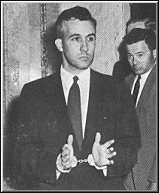

ElectionsFrancis Parker Yockey |
 In
the matter of "elections" which had a vogue of almost two centuries during
the life of Western civilization, both in Europe and in its spiritually
dominated areas elsewhere, an important law of political organisms is shown.
[Image: Yockey under arrest, just prior to his death in June 1960.] In
the matter of "elections" which had a vogue of almost two centuries during
the life of Western civilization, both in Europe and in its spiritually
dominated areas elsewhere, an important law of political organisms is shown.
[Image: Yockey under arrest, just prior to his death in June 1960.]
In "democratic" conditions ... occur the phenomena known as "elections." It was the theory of "democracy" arising about 1750 that the "absolute" power of the monarch, or the aristocracy, depending on local conditions, must be broken, and this power transferred to "the people." This use of the word "people" shows again the necessarily polemical nature of all words used politically. "People" was merely a negative; it merely wished to deny that the dynasty, or else the aristocracy, belonged to "the people." It was thus an attempt to deny the monarch or aristocracy political existence; in other words, this word implicitly defined them as the enemy in the true political sense. It was the first time in Western history that an intellectualized theory became the focus of political happening. Wherever the monarch or aristocracy were stupid or incapable, wherever they looked backward instead of adapting themselves to the new century, they went down. Wherever they took over the theories themselves and interpreted them officially, they retained their power and their command. The technique of transferring this "absolute" power to "the people" was to be through plebiscites, or "elections." The theoretical proposal was to give the power to millions of human beings, to each his nth/millionth fraction of total existing political power. This was of course impossible in a way that even the intellectuals could see, so the compromise was "elections" through which each individual in the organism could "choose" a "representative" for himself. If the representative did something, by a satisfying fiction it was agreed that each little individual "represented" had done that himself. In a short time it became obvious to men interested in power, either for themselves personally, or to carry through their ideas, that if one worked previously to one of these "elections" to influence the minds of the voting populace, he would be "elected." The greater one's means of persuasion of the masses of voters, the more certain was his subsequent "election." The means of persuasion were whatever one had at hand: rhetoric, money, newsprint. Since elections were large things, disposing of large amounts of power, only those who commanded corresponding means of persuasion could control them. Oratory came into its own, the Press stepped out as a lord of the land, the power of Money towered above all. A monarch could not be bought; what bribe could appeal to him? He could not be put under the usurers' pressure -- he could not be sued. But party politicians, living in times when values became increasingly money-values, could be bought. Thus democracy presented the picture of the populace under the compulsion of elections, the delegates under the compulsion of Money, and Money sitting in the seat of the monarch. So the absolute power remained -- as it must in any organism, for it is an existential law of every organism that: The power within an organism is constant, and if individuals, groups, or ideas within the organism are diminished in power, some other individuals, groups, or ideas are increased in power by that amount. This Law of Constancy of Intra-Organismic Power is existential, for if a diminution of power in one place within does not pass elsewhere within the organism, the organism is sickened, weaker, and may have lost its political existence as an independent unit. The history of South America from 1900 to 1950 is rich in examples of triumphant revolutions against regimes that stripped them of power -- which then moved to the United States of North America, and as long as that condition continued, the country in which such a revolution had occurred was a colony of Yanqui imperialismo.
Francis Parker Yockey, Imperium (1948; Costa Mesa, CA: Noontide Press, 1962), 163-65. The title above is editorial. Imperium can be purchased from Noontide Press and Northern Voice Bookstore. |

|

|